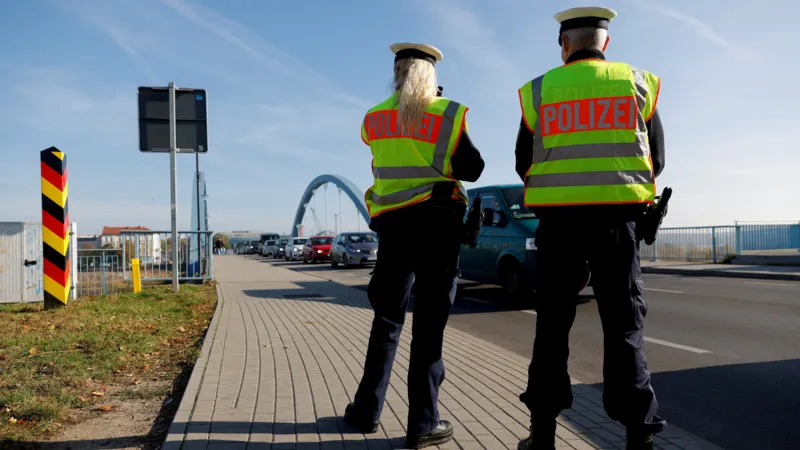In response to the tragic knife attack in Solingen, Germany is set to step up its border controls from September 16. The attack left three people dead, following which the German government has taken a tougher stance on immigration and security.
The suspect in the knife attack in Solingen, a Syrian national who had previously failed in an attempt to get asylum and was facing deportation, has been linked to the Islamic State group, further fuelling the debate over immigration policies. The attack has also intensified the government’s plan to expand border checks, a move initially set to last for six months.
New border controls announced
German Interior Minister Nancy Fieser announced the new border measures, stressing that the government is committed to addressing irregular migration and enhancing national security. “We are doing everything in our power to protect our country’s people from these threats,” Fieser said. The expanded checks will be implemented at all major border points, including those to Poland, the Czech Republic, Switzerland and Austria. Currently, Germany mainly carries out spot checks on roads and trains along its eastern and southern borders.
These new measures come at a time when political tensions have risen. The right-wing Alternative for Germany (AfD) party has made significant gains in recent local elections, topping a poll for the first time since the Nazi era. This political shift has put pressure on the ruling coalition to take a tougher stance on immigration.
Political pressure and responses
The increased border checks are seen by some as a direct response to the growing influence of the AfD. The ruling coalition, led by the Social Democratic Party (SPD), and other mainstream parties have been grappling with how to address the rise of the AfD. In the wake of the election results, there has been a notable shift in policy proposals, with some parties advocating stricter immigration measures.
The AfD’s success in regional elections, particularly in eastern Germany, has sparked debate about Germany’s approach to asylum and border management. The party’s rise has fueled calls for more restrictive policies, including a proposal by the Christian Democratic Union (CDU) to turn away asylum seekers at the border, even if they are eligible for protection based on having passed through other safe EU countries.
Germany’s migration policy context
Germany has historically been a major destination for refugees, particularly during the 2015-2016 migrant crisis when more than one million people, many of them fleeing the conflict in Syria, sought asylum in the country. The ongoing conflict in Ukraine has also led to the arrival of 1.2 million Ukrainians since Russia’s full-scale invasion began in February 2022.
The Solingen attack has prompted the German government to review and adjust its migration policies. Measures announced include tightening rules for refugees facing deportation, which would end benefits, and resuming the deportation of convicted Afghan criminals. These changes mark a significant shift in Germany’s approach to migration and border security.
International reactions and impact
Neighbouring country Austria has also voiced its opinion on the issue. Austrian Interior Minister Gerhard Karner said Austria would not accept migrants rejected by Germany, highlighting the growing pressure on European migration policies.
The focus on immigration and border controls has sparked a wider debate about security and integration in Germany. Critics argue that the new measures may be more about addressing political pressures than effectively enhancing security. They suggest that focusing solely on immigration policies may not fully address the underlying issues of radicalisation and violence.
Looking ahead
As Germany implements these new border controls, the impact on both national security and public opinion will be closely monitored. The government’s approach to dealing with the aftermath of the Solingen attack and its response to growing political pressures will shape the future of Germany’s immigration policies and its political landscape.
In conclusion, the strengthening of border controls reflects a broader trend of intensified scrutiny on immigration and security issues in Germany. The response to the Solingen attack underscores the complex interrelationship between security concerns, political pressures, and public sentiment, and highlights the challenges policymakers face in addressing these multifaceted issues.
